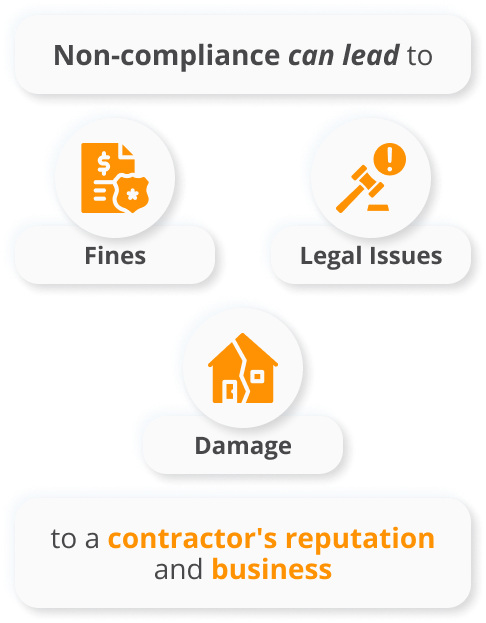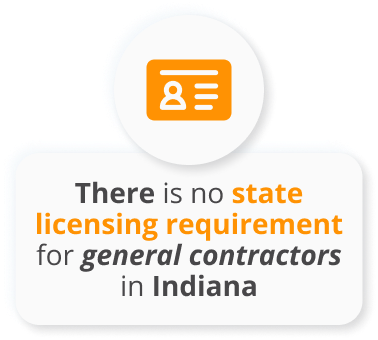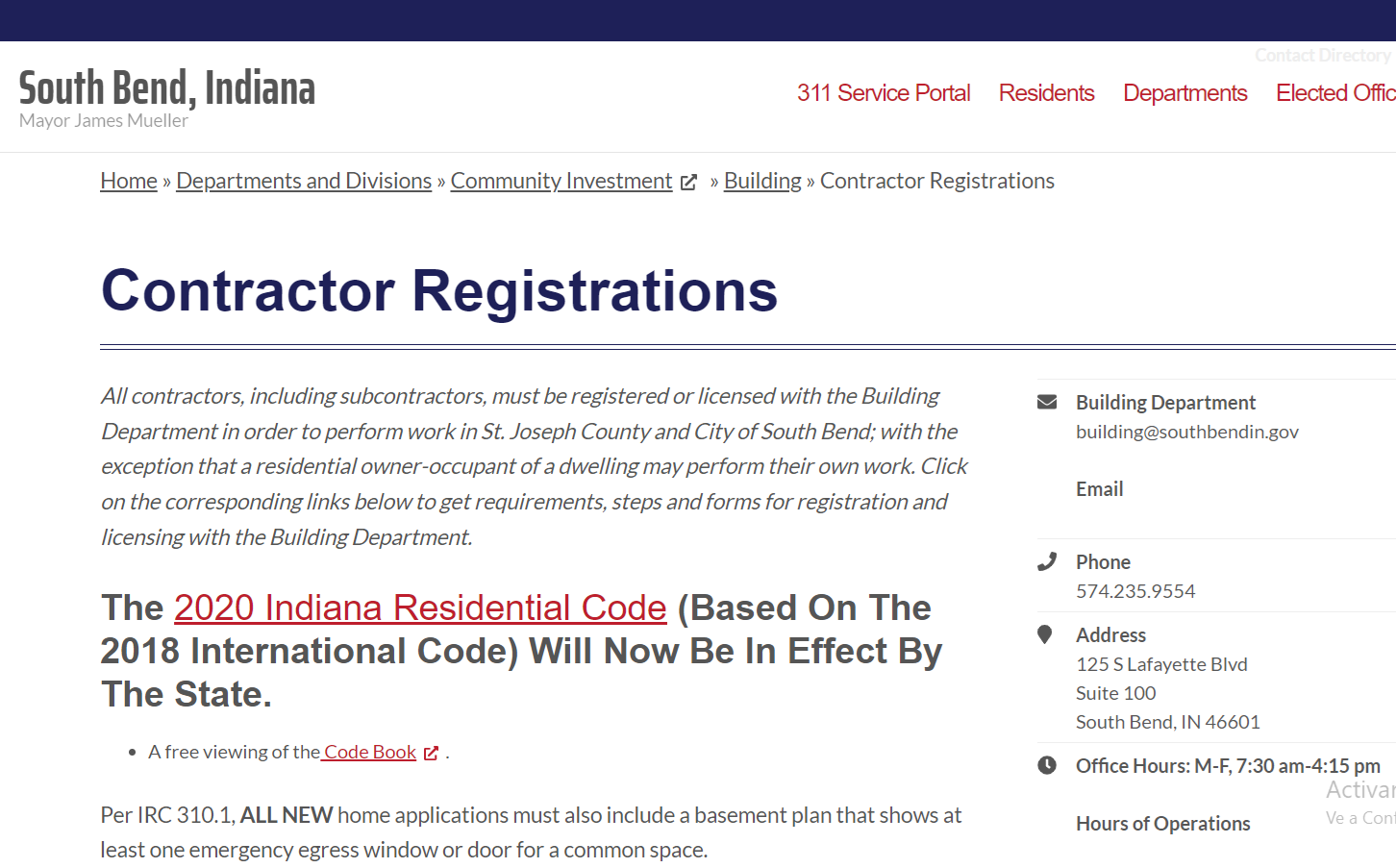Building Success in Indiana’s Diverse Contracting Landscape: Navigating Local Licensing with Confidence. Get Your General Contractor License in Indiana.
In Indiana, the landscape of contractor licensing presents a unique scenario. Unlike many states that mandate a state-level license for general contractors, Indiana stands out with its more localized approach to contractor regulation. This decentralized framework means that while the state does not require general contractors to hold a state-issued license, the responsibility and authority to regulate contractors fall to individual local jurisdictions.
This localized approach to licensing in Indiana underscores the importance of contractors being well-informed about the specific requirements of the areas where they plan to work. The Consolidated City of Indianapolis (Marion County), Lake County, and South Bend/St are key jurisdictions. Joseph County has established its rules and regulations for general contractors. These requirements, which can include general liability insurance, bonding, and sometimes passing an exam or meeting experience criteria, are essential for contractors to understand and comply with.

The absence of a statewide licensing requirement in Indiana does not diminish the importance of adhering to local regulations. In fact, it places a greater emphasis on contractors to be proactive in understanding and meeting the varied requirements of different jurisdictions. Failure to comply with these local mandates can lead to significant consequences, including fines, legal penalties, and potential damage to a contractor’s reputation and business operations.
For contractor licensing information in Indiana, here are the key details:
Contact Information:
Indianapolis Department of Business and Neighborhood Services
Web: Indianapolis BNS
Alternate Phone Number: 512-463-6599 (For calls outside Texas)
Alternate Phone Number: 512-463-6599 (For calls outside Texas)
Phone: 317-327-8700
Alternate Phone Number: 512-463-6599 (For calls outside Texas)
Alternate Phone Number: 512-463-6599 (For calls outside Texas)
Address:
Main Office: 1200 Madison Ave, Suite 100, Indianapolis, IN 46225
For more information, visit: Indianapolis BNS
Local Licensing for General Contractors in Indiana
In Indiana, the approach to contractor licensing is distinctively localized, a departure from the more centralized state-level licensing systems found in many other states. This section explores why local jurisdictions in Indiana might opt for their own licensing requirements and the significance of adhering to these local regulations.

Why Local Jurisdictions Require Licenses
- Tailored Regulations: Local jurisdictions have unique needs and standards. By implementing their own licensing requirements, they can tailor regulations to address specific local concerns, such as environmental factors, historical preservation, and community safety standards.
- Quality Control: Local licenses serve as a mechanism to ensure that contractors working in the area possess the necessary skills and knowledge relevant to that specific region. This helps maintain a high standard of workmanship and safety in construction projects.
- Consumer Protection: Licensing at the local level enhances consumer protection. It provides a vetting process that helps residents and businesses identify qualified and reliable contractors, thereby reducing the risk of substandard work and fraudulent practices.
- Local Economy and Workforce Development: By regulating contractors locally, jurisdictions can foster a competitive and fair market, supporting the local economy. It also encourages the development of a skilled local workforce, as contractors are often required to demonstrate a certain level of experience or training.
Importance of Adhering to Local Regulations
- Legal Compliance: For contractors, compliance with local licensing laws is a legal necessity. Operating without a required license can lead to fines, legal action, and the potential shutdown of construction projects.
- Reputation and Trust: Adhering to local licensing requirements builds trust with clients and enhances a contractor’s reputation. It signals professionalism and a commitment to quality and legal standards.
- Access to Opportunities: Many local jurisdictions may restrict bidding on public and private projects to licensed contractors. Therefore, obtaining the necessary local licenses opens up a wider range of business opportunities.
- Avoidance of Penalties: Non-compliance can result in significant penalties, including fines and legal consequences. In some cases, it can also lead to the denial of future licensing opportunities or renewal of existing licenses.
Common Licensing Requirements Across Jurisdictions for General Contractors in Indiana
While each local jurisdiction in Indiana may have its specific licensing requirements for general contractors, common elements frequently appear across these different areas. Understanding these common requirements, such as general liability insurance, bonding, and other potential prerequisites like exams or experience, is crucial for contractors. Here’s a detailed look at each of these key requirements:


General Liability Insurance
- What It Is: General liability insurance is a fundamental type of insurance that provides coverage against claims of bodily injury, property damage, and other risks that can occur during construction projects.
- Importance: This insurance protects contractors from the financial fallout of accidents and damages that might occur on a job site. It is not only a safeguard for the contractor but also offers peace of mind to clients, knowing that potential damages or injuries are covered.
- Typical Coverage: Policies usually cover legal fees, medical expenses, and damages if the contractor is found liable for property damage or injuries. The specific terms and coverage limits can vary, so choosing a policy that aligns with the nature and scale of the contractor’s work is important.

Bond
- Purpose of the Bond: A bond guarantees that the contractor will fulfill their contractual obligations. If the contractor fails to complete a project as agreed or fails to pay for permits, materials, or subcontractors, the bond can provide financial compensation to the affected parties.
- Types of Bonds: The most common types are performance bonds, which ensure project completion following contract terms, and payment bonds, which guarantee payment to subcontractors and suppliers.
- Benefits: Bonds protect the client and enhance the contractor’s credibility by demonstrating financial responsibility and commitment to fulfilling contractual duties.

Other Potential Requirements
- Exam: Some jurisdictions may require contractors to pass an exam that tests their knowledge of construction practices, local building codes, and business management principles. These exams ensure contractors have the necessary expertise to perform their work competently.
- Experience: Demonstrating a certain level of experience in the construction industry can also be a requirement. This experience criterion ensures that contractors have practical, hands-on knowledge and skills in their field
- Continuing Education: In some cases, contractors might be required to complete continuing education courses to stay updated with the latest building codes, safety regulations, and industry trends.
Licensing Requirements in Key Indiana Jurisdictions
Navigating the local licensing requirements in Indiana can be a complex task, given the variations across different jurisdictions. Here, we provide a focused overview of the licensing requirements in three key areas: the Consolidated City of Indianapolis (Marion County), Lake County, and South Bend/St. Joseph County.


Consolidated City of Indianapolis (Marion County)
- Overview of Requirements: In Indianapolis, general contractors must comply with specific licensing requirements set by the city. These often include proof of general liability insurance and a surety bond. The city may also require contractors to demonstrate their experience and, in some cases, pass a competency exam.
- Application Process: Contractors must complete an application process, which includes submitting the necessary documentation and paying a licensing fee.
- Additional Information: For more detailed information on the licensing process, required documentation, and fee structures in Indianapolis, contractors can visit the official website: Consolidated City of Indianapolis Contractor Licenses.
Lake County
- Summary of Requirements: Lake County’s licensing criteria for general contractors include providing evidence of insurance and bonding. The county may also have specific requirements regarding the contractor’s experience and qualifications.
- Application and Renewal: The application process involves submitting the required documents and a fee. Contractors should also be aware of the renewal process and any continuing education requirements.
- Detailed Information: Contractors can access the complete licensing packet and additional resources at: Lake County Contractor Licensing Packet.
South Bend/St. Joseph County
- Licensing Process and Requirements: In South Bend/St. Joseph County, general contractors are required to meet local licensing standards, which typically include insurance and bonding. The jurisdiction may also mandate specific qualifications or exams.
- Steps to Obtain a License: The process involves completing an application, providing the necessary documentation, and paying the applicable fees.
- More Information: For a comprehensive understanding of the licensing requirements in South Bend/St. Joseph County, visit: South Bend/St. Joseph County Contractor Licenses.
Each of these jurisdictions has its unique set of requirements and processes for licensing general contractors. It is crucial for contractors to familiarize themselves with the specific regulations of the area where they plan to operate to ensure compliance and avoid any legal or financial repercussions.
Steps to Ensure Compliance in Different Jurisdictions
Navigating the diverse landscape of local licensing requirements in Indiana can be challenging. Here’s a step-by-step guide to help contractors ensure compliance in different jurisdictions, along with tips for staying updated with changing regulations:
- Determine the specific local jurisdiction (city or county) where you plan to undertake construction projects. Each jurisdiction in Indiana may have different licensing requirements.
- Visit the official website of the local government or building department to find detailed information on contractor licensing requirements. This may include insurance, bonding, exams, and experience prerequisites.
- Compile all required documents, such as proof of insurance, financial statements, and any certificates from completed exams or training programs.
- Fill out the licensing application form, which is usually available online or at the local building department. Ensure that all information is accurate and complete before submission.
- Submit the necessary fees associated with the licensing application. These fees vary by jurisdiction and are typically non-refundable.
- Send your application along with all required documentation to the appropriate local authority. Some jurisdictions may allow online submission, while others might require a physical submission.
- After submitting your application, there will be a processing period. During this time, the local authority will review your application and documents.
- Regulations and requirements can change. Regularly check the local government’s website or subscribe to newsletters for updates. Building relationships with local building departments and participating in local contractor associations can also provide timely information on regulatory changes.
Tips for Staying Updated:
- Attend local contractor meetings and workshops.
- Network with other professionals in the industry.
- Regularly review industry publications and websites.
Consequences of Non-Compliance
Failing to adhere to local licensing laws in Indiana can have serious implications for contractors. Understanding these consequences underscores the importance of compliance:

Fines and Penalties
Non-compliance can result in substantial fines and penalties. These fines vary depending on the jurisdiction and the severity of the violation.

Legal Action
In some cases, operating without a proper license can lead to legal action, including lawsuits from clients or actions from the local government.

Reputation Damage
Being found non-compliant can harm a contractor’s reputation, making it difficult to secure future projects or maintain professional relationships.

Project Delays or Shutdowns
Without proper licensing, projects may be delayed or shut down by local authorities, leading to financial losses and dissatisfied clients.

Ineligibility for Future Licensing
Repeated violations or severe non-compliance can lead to a contractor being deemed ineligible for future licenses, severely impacting their ability to operate legally in the future.
Importance of Compliance:
- Ensures legal operation and avoids legal complications.
- Builds trust with clients and enhances professional credibility.
- Enables access to more business opportunities and public projects.
Frequently Asked Questions (FAQ)
These are common questions about General Contractor License in Indiana.
No, Indiana does not require a state-level license for general contractors. However, specific local jurisdictions within the state may have their own licensing requirements.
Common requirements include general liability insurance, bonding, and, in some cases, passing an exam or demonstrating experience. These requirements can vary by location.
To find out the specific licensing requirements for a jurisdiction, visit the official website of the local government or building department in that area. They will provide detailed information on the prerequisites.
Operating without the necessary local license can result in fines, penalties, legal actions, and damage to your professional reputation. It’s essential to comply with local regulations.



